Thought I’d share some of the ideas that’s been inspiring me the last couple of days
. I’ve added some context to each quote so to show why and/or how I find them valuable and important.
As always, most slides are available under CC-license on flickr.
- Update: Please add your voice to the stream and name your favorite idea/quote, and why, as a comment at the end of the post. Thank you.
1. “The inescapable conclusion is that anyone who thinks advertising is the key to sustainable online businesses in any field other than search should think again” – John Naughton
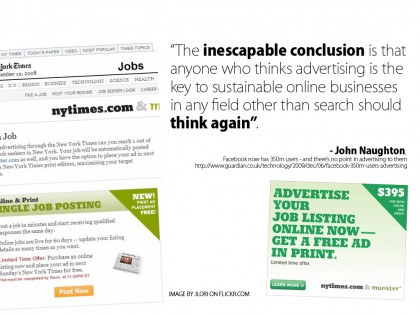
Context: The business and marketing opportunity online is enormous, but only a small niche of it is related to the traditional advertising currency. We need to unlearn the idea that online is universally a media channel, and start looking for real life currency.
2: “ComScore also concluded that a hard core of 8% of all internet users – christened “Natural Born Clickers” – are responsible for 85% of all banner clicks on the web.” – John Naughton
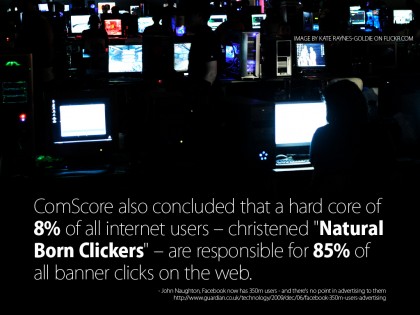
Context: The current prevailing business model for online media is no longer sustainable
. I have previously pointed to both the external and internal challenges to the online display advertising format. None of this is news to media companies struggling to survive 09 and 10. But it only proves that we re running out of time, and that the next business model is not an incremental makeover of the current format, but that we need new ideas through disruptive change.
3: “A customer is a novel and stable pattern of human behavior.” -Marketing, Innovation and the Creation of Customers
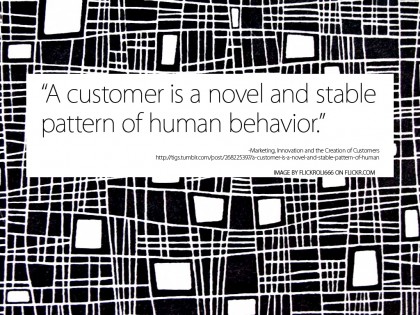
Context: People are not demographics, and talking about them as if they are makes communicating with them seem much simpler and different than it is. Slapping on an algorithm online does not make your advertising work. It might incrementally increase the effectiveness of it, but still: The ability of a display advert to communicate with an inherently complex human being at any given time is impossible for an algorithm improve. It comes down to this: Demographics hides the real value and effect of the communication – and our measuring models continues to support this model for the worst for companies and customers
4: “The extension of online computer services to all individual in the form of mass information utilities may radically alter society as we understand it today. (1971) – Mass Information Utilities and Social Excellence by Harold Sackman
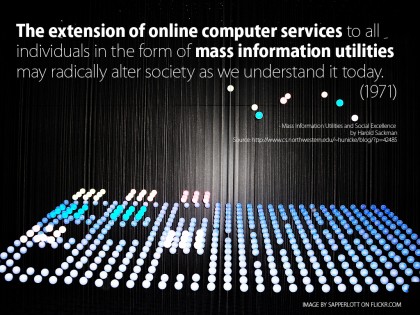
Context: We knew this almost 40 years ago, why did we forget it? Why did marketing overly focus on digital as a media channel, rather than a set of opportunities for integrating better experiences with the product?
5: “The next phase of media, I’ve been thinking, will be after the page and after the site. Media can’t expect us to go to it all the time. Media has to come to us. Media must insinuate itself into our streams.” – Jeff Jarvis
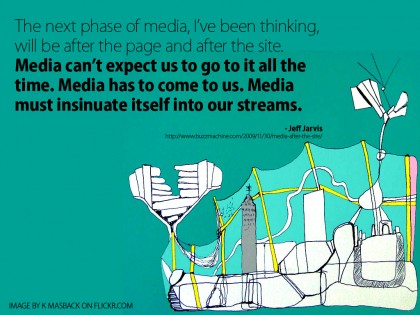
Context: The removal of destinations and increased attention to streams are increasing. This point is also enforced by amongst others Boyd and Jenkins. The idea of streams is more related to Shirky’s idea of journalism, rather than Murdoch’s business model approach
. I reckon both will succeed, as opportunity for the niches seem to be the mantra of the web (long tail = stop looking for universals).
6: “My mind now expects to take in information the way the net distributes it: in a swift-moving stream of particles.” – “the narrative does not simply transmit information, but invites the reader or listener to witness the unfolding of events.” – Ben Macintyre, The internet is killing storytelling
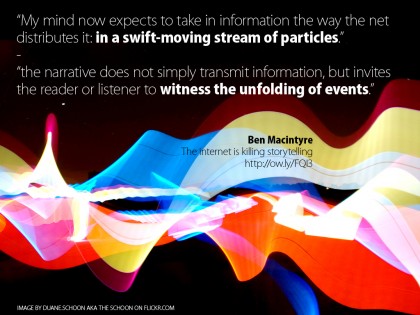
Context: Both the idea of “stream of particles” and “witness the unfolding events” give a clear notion of the abilities of storytelling on connected and participatory platforms. Finally we are starting to see the potential rather than exploiting the interweb as nothing more than a distribution platform for existing stories built for static and traditional platforms.
7: Transmedia describes a new approach to telling stories given:
- 1
. The growth of “participatory” media, like blogs.
2. An explosion of new devices that allow you to both consume and produce media socially.
3. the persistence of “old media”.
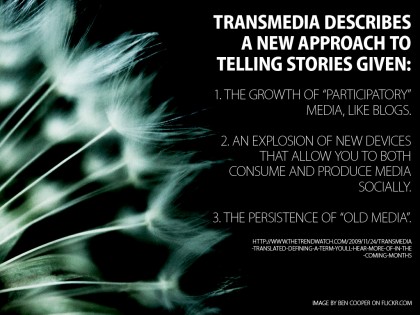
Context: Transmedia introduces ideas concerning far more than mere storytelling. It seems to represent the whole notion of how we communicate to each other through connected platforms. In other words: transmedia serves a mirror of our connected lives.
8: “Brands must understand that people have their own personal brands and are not willing to associate with anything lame.” Ajaz Ahmed, co-founder and chairman of AKQA
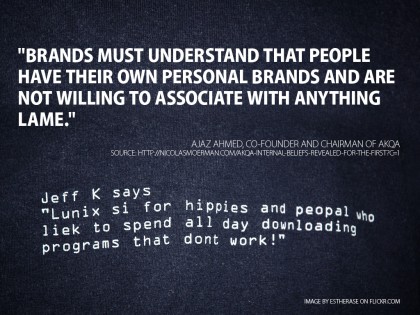
Context: A wonderful description by Ajaz. We are what we share (as I think Jenkins suggested?)
benefits, risks, and costs of the available treatment strategiesThe physician must tailor the laboratory work up based How to use sildenafil citrate tablets.
. How does your marketing help people tell their friends who they are?
9: “I mean, people spend maybe ten or twenty hours with one of my books. They spend thousands of hours in a gaming universe, and moving through it with a level of awareness and expectation for novelty that people used to approach, say, James Joyce.” – Douglas Rushkoff
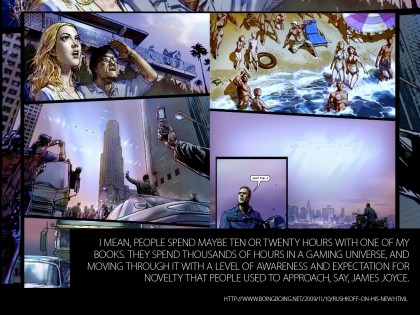
Context: Douglas Rushkoff ads yet another voice to the notion that connected and participatory platforms are your best arenas for growing premium participants and customers. As I’ve quoted Kevin Slavin of Area/Code a number of times: “People will watch a tv program once, maybe twice, but you they will play chess a hundred or maybe a thousand times”.
10: “The traffic which comes in from Google brings a consumer who more often than not read one article and then leaves the site
. That is the least valuable of traffic to us… the economic impact is not as great as you might think. You can survive without it,” – Rupert Murdoch
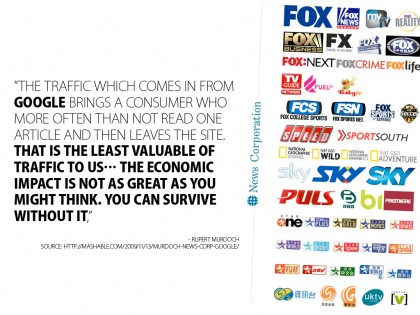
Context: I believe that the Internet is the landscape for the niches. And even if News Corp to no extent can be identified as a niche, there is true logic in what Newscorp is doing. The question is not if this will work or not, but rather why it might work. Lets spend our energy exploring this idea, and we will come out less as “free”-idealists, and more as believers in niches.
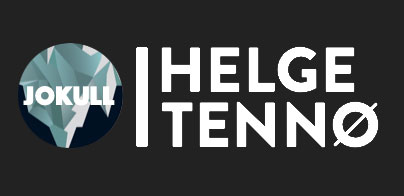

At our wesbites the traffic that comes from organic search results (via Google in about 95% of the visits through search engines) is of more quality (more pageviews per visit and more time spent per visit) than the people that know our URL’s and type it in themselves.
Thanks Mark, your commenting on the Murdoch thing, and the point you make is extremely important.
But why do you then think Murdoch is doing what he is doing – and if he is doing it, what would it take to make it work?
Helge
I guess he’s trying to make an argument why he wants to ban google from his sites. He will get a lot of criticism.
Old school media thinking if you’d ask me. If more than 80% of internet sessions start with a search query and your business model is based on traffic for your site. I would advise Murdoch to act differently.
You have to respect the guy for his achievements but those were mostly more than 10 years ago.
Again, thanks for adding your thoughts to the stream Mark :)
I find the equation understandable:
Murdoch doesn’t want to give his product away for free anymore – with the consequence of having to destroy it with bad advertising in order to have a business model. And that he sees the current businessmodel as not sustainable.
And understanding that as long as his product is of high quality and unique – not available for free somewhere else – people will be willing to pay for it.
But this is also where I stop to see what the plan is. And that is why it is difficult for me to say that it won’t work.
I understand Murdoch’s outset, and I am looking forward to seeing where he is going after the “Google shutout”. Maybe he has some surprises up his sleeve?
Helge
Great slides Helge and interesting insights with regards to the massive changes occurring across the entertainment, technology and advertising industries. I haven’t personally seen or heard of anyone, but I would be curious to know if there are others in traditional media organizations and beyond (those who are not privy to Murdoch’s plans) who agree with Murdoch and his bold statements.
I think it’s particularly interesting because if Google (specifically Eric Schmidt) makes the case that their strength as a brand and continued momentum resides in the fact that there is tremendous public trust in their services – and that they would fail without it, then what plans might Murdoch have up his sleeve that makes him think HIS empire could function in this new paradigm without this trust. Your thoughts?
Interesting question Zack.
Personally I’m not quite sure if the general trust Google is experiencing related to its service is quite relevant for the product or operation Murdoch is trying change.
I don’t think the trust is the problem.
Murdoch is locking himself out of the “streams” and forcing people into “destination” websites. Which is the opposite of to the trends we are seeing. But as I find the future of media a complete haze, and the fact that we have no idea where they are heading with their future business models, I can’t nothing but try to learn from his example and understand how it might work, not exclude the operation all together.
Best
Helge
Nice post, and it’s a little similar to one I published yesterday on the continuing media upheaval.
http://www.amusingourselves.com/featured/mediaquake-2009-top-10-insights-into-the-years-media-shakedown
[…] A Collection Of Ten Inspiring Ideas (180360720.no) […]
RE: 9
“connected and participatory platforms are your best arenas for growing premium participants and customers.” – yes, and we should remember that these platforms are not only online/digital